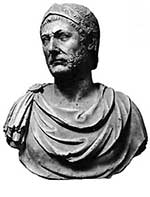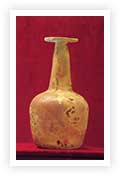 |
| Hannibal |
No Carthaginian is more renowned than Hannibal, the general and statesman who lived from 246 to 183 BC.
As a child, Hannibal left Carthage with his father, Hamilcar, to conquer Spain. He became a distinguished soldier under his son-in-law, Hasdrubal. At the latter’s death in 229 BC, he was appointed Commander-in-Chief of the Punic armies. He immediately started on social and political projects to enhance Punic presence within the Iberian Peninsula.
The increasing Roman interference in Spain encouraged Hannibal to launch a pre-emptive attack on Rome. He left Spain in 218, crossed the Alps with his famous elephants, and destroyed a series of Roman armies in the battles of Trebia, Lake Trasimeno and Cannae.
 The war eventually ended in North Africa, when Hannibal was defeated by the Roman General Scipio in 202 BC at Zama in central Tunisia. Carthage re-emerged and prospered again before being finally destroyed by Rome in 146 BC. The war eventually ended in North Africa, when Hannibal was defeated by the Roman General Scipio in 202 BC at Zama in central Tunisia. Carthage re-emerged and prospered again before being finally destroyed by Rome in 146 BC.
Unfortunately, the only surviving documents about Hannibal and the Punic Wars were written by Roman historians. But even his enemies described Hannibal as a great and humane general.
Hannibal used to forbid his soldiers all actions of pillage and vandalism. He has always respected the gods by invoking them during his speeches and used to go to sanctuaries to pray and make sacrifice to the gods. He ordered his men to respect places of warship and forbade pillage of their treasures. So therefore, at a time when he was short of gold, he refused to use the gold column in Goddess Hera’s temple near Crotone. |

